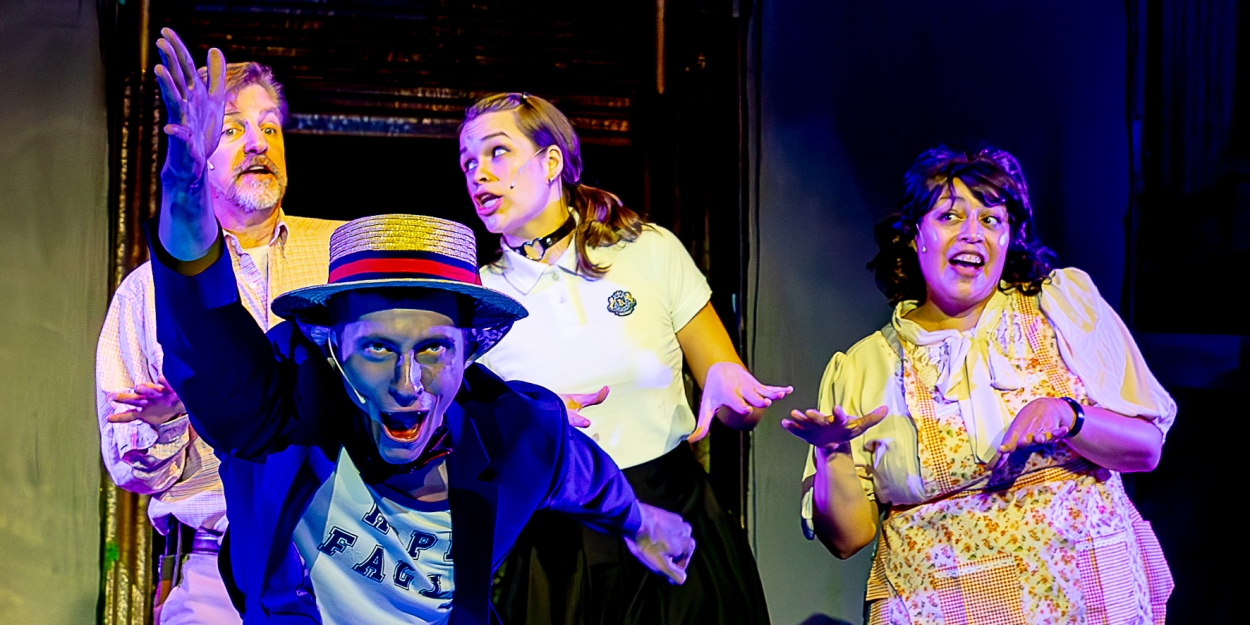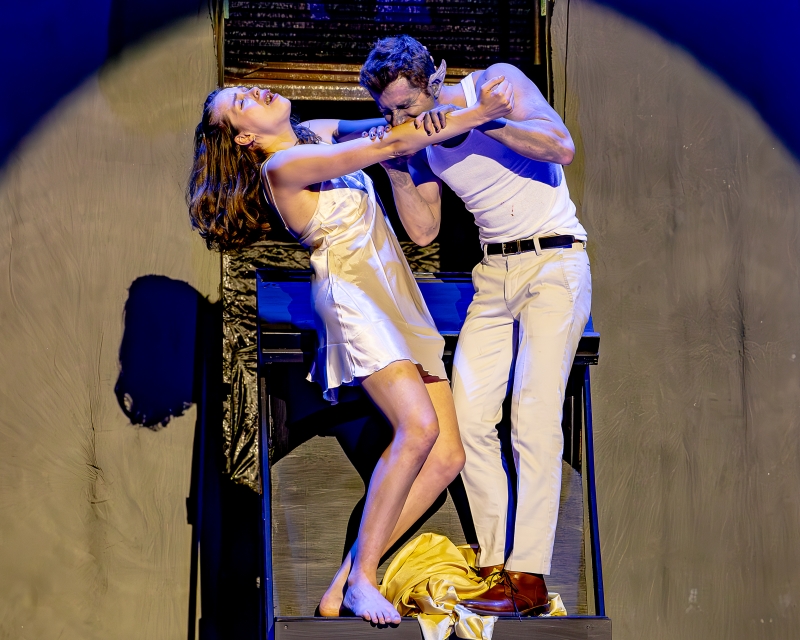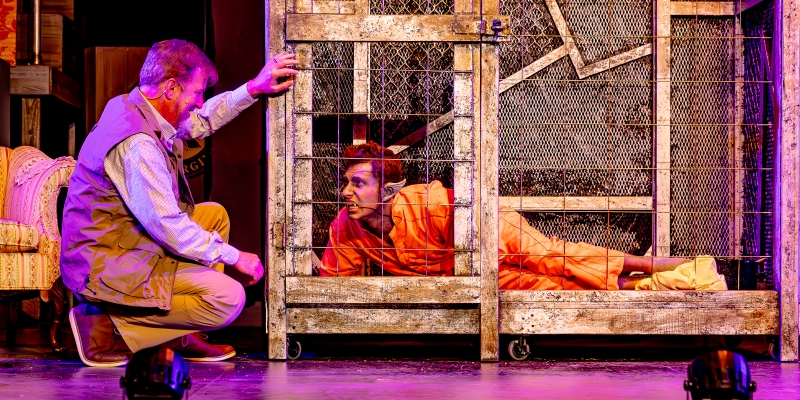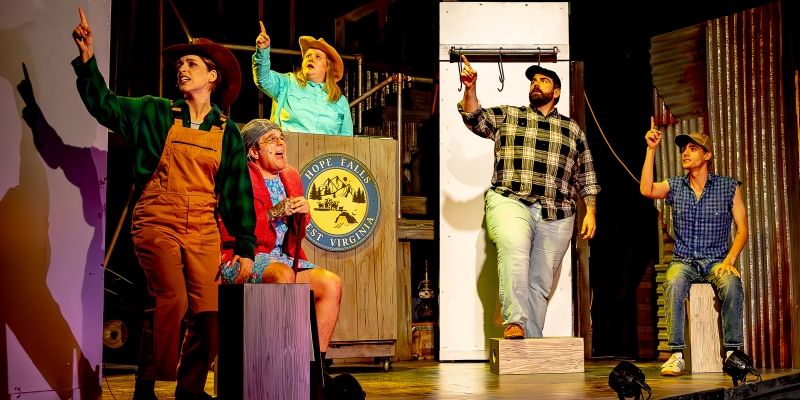Review: Catalyst Theater Company’s BAT BOY Transforms Prejudice
Catalyst Theater Company's "Bat Boy: The Musical," which closed on 11/17 at the Ducret Center of Art, looks at the monsters within us all.

When a creature learns to love, who teaches him — and at what cost? Catalyst Theater Company’s production of Bat Boy: The Musical transforms a tabloid headline into a nuanced meditation on family, acceptance, and the price of civilization. Under David Boyd’s visionary direction, this cult favorite becomes an intimate chamber piece about how one outsider’s presence forces an entire community to confront their own humanity.
The story begins when three teenage spelunkers discover a feral “bat boy” with fangs in a cave near Hope Falls, West Virginia. Brought to the home of veterinarian Dr. Parker, the creature is taken in by Parker’s wife Meredith, who names him Edgar. As cattle begin dying mysteriously and tensions rise in the struggling town, Edgar’s presence becomes a lightning rod for the community’s fears. But it’s through his relationships with the Parker family — namely Meredith, Shelley, and Dr. Parker himself — that the show finds its emotional core.
Nick Rubano’s Edgar and Tracey Lynne Haskell’s Meredith create the show’s most compelling relationship. Their early scenes together, as she teaches him language through children’s books, are deeply touching. Haskell beautifully conveys Meredith’s transition from sympathy to genuine maternal love, singing “I’m not here to harm you or make you feel ashamed” with heartbreaking tenderness. When we later learn she is actually Edgar’s biological mother — and that his existence is the product of a horrific encounter involving her husband’s experimental pheromones and a swarm of bats — their scenes take on new layers of meaning. Haskell masterfully portrays a woman trying to atone for initially rejecting her child by giving him the tools to survive in a world that will ultimately reject him.
.jpg)
Beth Siegling’s Shelley and Edgar develop a passion for each other that challenges both characters’ understanding of themselves. Their journey from mutual disgust to acceptance and romance provides the show’s most hopeful moments. Siegling brings particular depth to Shelley’s awakening, as she moves from mocking Edgar’s attempts at refinement to defending him against her former boyfriend Rick’s cruelty. Their duet “Inside Your Heart,” where Shelley offers her blood to the hungry Edgar as proof of her love, becomes both beautiful and tragic — a moment of radical acceptance that cannot survive in the larger world.

Scott McGowan’s Dr. Parker embodies the show’s darkest themes. Initially presenting himself as Edgar’s potential savior, Parker’s facade crumbles as his jealousy over Meredith’s maternal love for Edgar grows. McGowan brilliantly charts Parker’s descent from respected physician to monster, revealing how his scientific rationality masks deeper, darker impulses. The revelation that he is Edgar’s biological father (through his misuse of experimental pheromones) makes his rejection of the boy even more damning, and his ultimate demise more striking.

The rest of the cast brings remarkable depth to what could have been one-dimensional townspeople, mostly taking on multiple roles, including at least one of another gender. They deftly navigate the show’s tonal shifts, leaning into their characters’ exaggerated mannerisms and cowboy posturing, while never losing sight of their essential humanity. Even in their most prejudiced moments, these performers ensure we understand their characters’ motivations.

The technical elements reinforce these relationship dynamics brilliantly. Boyd’s scenic design features multiple levels that allow the actors to literally look down on Edgar, while blood-red lighting floods the stage whenever characters give in to their baser instincts. The intimate staging at the Ducret Center of Art places the audience close enough to see every flicker of emotion, making the show’s gradual descent all the more affecting. The creative team includes Michael Nuzzo as Musical Director and Sheila Barker as choreographer, whose work helps transition the show seamlessly between its comedic and tragic moments.
Catalyst Theater Company, founded in 2018 and making its mark with successful productions of Saucy Jack and the Space Vixens and Elling, has found in Bat Boy a perfect vehicle for its mission of creating progressive theatrical experiences that stimulate the imagination and facilitate emotional transformation. Perhaps the real monster story isn’t about Bat Boy at all — it‘s about how quickly a community can turn on those who are different, and how love can either save or destroy us depending on whether we let fear win.
Reader Reviews

Videos
